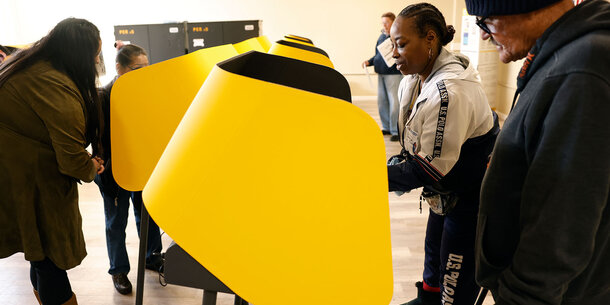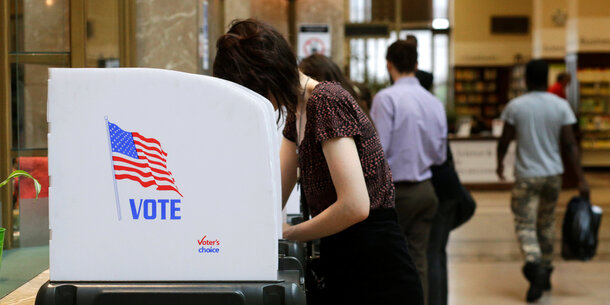How Voter ID Laws Threaten Transgender Voters
American democracy is better when all citizens, regardless of gender identity or expression, are able to participate.

Today is the annual Transgender Day of Remembrance. On this day, we mourn the voices in the transgender community that have been lost to senseless acts of hate and violence. Yet we must also recognize that violence is not the only way that transgender voices are silenced. Voter identification laws in states across the country often pose an insurmountable obstacle to transgender voters casting a ballot.
Currently, 35 states require an ID to vote, and 18 of those states require a photo ID. Over the past 15 years, a number of states have adopted strict voter ID laws that do not offer an alternative option for voters who cannot obtain an ID. These voter ID laws present unique and significant challenges to transgender and nonbinary voters.
Many transgender and nonbinary voters do not have a form of identification that matches their gender identity. The Williams Institute, an LGBTQ research hub at the University of California Los Angeles, has estimated that 260,000 transgender people who live in the 35 states with voter ID laws did not have a form of ID that accurately reflected their name and/or gender identity to use in the 2020 general election. This number represents more than one quarter of the transgender adult population eligible to vote in the 2020 general election.
In just the past few years, numerous transgender voters have been harassed or challenged at the polls because their gender expression or name differs from the ID presented to poll workers. This kind of harassment has a chilling effect on all transgender and nonbinary voters and increases the fear of being targeted, outed, or challenged at the polls, which serves to further suppress the power of their communities.
Updating identification documents to reflect the correct name and gender marker can be daunting. This process can be costly, time-consuming, and confusing, with laws varying significantly from state to state. Some states go as far as to require proof of gender-affirming surgical care or a court order to update a gender marker. Additionally, a majority of states do not have nonbinary gender marker options, creating problems for voters who do not identify as male or female.
The particular challenges faced by transgender and nonbinary voters amplify the general burdens associated with obtaining voter ID. As Brennan Center research has previously documented, significant financial barriers prevent potentially millions of otherwise eligible voters from obtaining voter IDs in the states with the most strict and onerous voter ID policies. And it’s no surprise that these policies hit low-income communities and communities of color the hardest. Additionally, a disproportionate number of transgender Americans are people of color or live in poverty. Beyond obtaining voter ID, transgender and nonbinary Americans are also overrepresented among homeless Americans, who face challenges establishing residency to register to vote in the first place.
States are starting to take notice of these issues and act on them.
Some states have taken major steps to eliminate the barriers to obtaining accurate voter IDs for their transgender and nonbinary citizens. Some states like Oregon and Minnesota, for example, provide their residents with the opportunity to choose the gender designation on their ID from additional options such as “not specified” or “other.” States like Maine go even further and make it free for nonbinary individuals to change the gender designation on their IDs. These states’ efforts may go a long way in normalizing the presence of persons that do not identify with either male or female genders and reducing discrimination against transgender and nonbinary Americans.
Beyond that, states should reform overly restrictive voter ID laws. Proponents of ID laws have claimed that they are needed to prevent voter fraud — but the Brennan Center and others have repeatedly debunked the myth of rampant voter fraud. At the federal level, Congress should also pass the John R. Lewis Voting Rights Act, which would help to prevent states from implementing discriminatory voter suppression laws in the first place.
Our democracy is better when all citizens, regardless of gender identity or expression, are able to participate in it. Transgender and nonbinary Americans deserve to have their voices heard without undue burdens, costs, and barriers. On this Transgender Day of Remembrance, let’s help end the silencing of our fellow Americans and fight for reform so that we are all able to exercise our right to vote.






